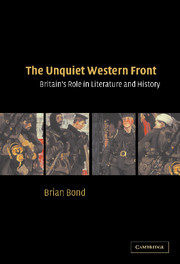Book contents
- Frontmatter
- Contents
- PREFACE AND ACKNOWLEDGEMENTS
- 1 THE NECESSARY WAR, 1914–1918
- 2 GOODBYE TO ALL THAT, 1919–1933
- 3 DONKEYS AND FLANDERS MUD THE WAR REDISCOVERED IN THE 1960S
- 4 THINKING THE UNTHINKABLE THE FIRST WORLD WAR AS HISTORY
- SIR LEES KNOWLES (1857–1928)
- THE LEES KNOWLES LECTURES
- NOTES
- SELECT BIBLIOGRAPHY
- INDEX
PREFACE AND ACKNOWLEDGEMENTS
Published online by Cambridge University Press: 20 July 2009
- Frontmatter
- Contents
- PREFACE AND ACKNOWLEDGEMENTS
- 1 THE NECESSARY WAR, 1914–1918
- 2 GOODBYE TO ALL THAT, 1919–1933
- 3 DONKEYS AND FLANDERS MUD THE WAR REDISCOVERED IN THE 1960S
- 4 THINKING THE UNTHINKABLE THE FIRST WORLD WAR AS HISTORY
- SIR LEES KNOWLES (1857–1928)
- THE LEES KNOWLES LECTURES
- NOTES
- SELECT BIBLIOGRAPHY
- INDEX
Summary
In delivering the annual Liddell Hart lecture at King's College London in November 1997 I had an early opportunity to outline my views on the many myths and misrepresentations which have distorted British understanding of the nation's achievement in the First World War and, more particularly, of the Army's role on the Western Front. When, shortly afterwards, I was invited by Trinity College Cambridge to give the prestigious Lees Knowles lectures in 2000 this seemed an ideal opportunity to examine this huge and controversial subject in more detail and over a longer period. The programme of four lectures, given under the umbrella title ‘Britain and the First World War: the challenge to historians’, permitted me to pay more attention to the 1960s, when earlier ‘disenchanted’ and profoundly critical views of the First World War were rediscovered and much developed. Part of my argument throughout has been that military historians have in general failed to present a positive interpretation of Britain's role in the war or, at any rate, that their versions have been overwhelmed and obliterated by the enormous impact of supposedly ‘anti-war’ poetry, memoirs, novels, plays and films. While the best of these imaginative literary and personal interpretations have deservedly remained popular and influential they ignored, or failed to answer convincingly, the larger historical questions about political and strategic issues: what was the war ‘about’? how was it fought? and why did Britain and her allies eventually emerge victorious?
- Type
- Chapter
- Information
- The Unquiet Western FrontBritain's Role in Literature and History, pp. vii - xPublisher: Cambridge University PressPrint publication year: 2002



